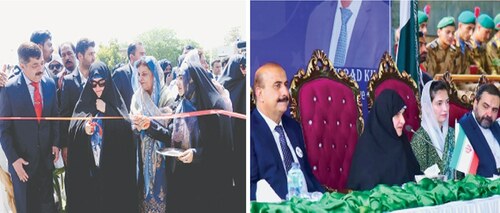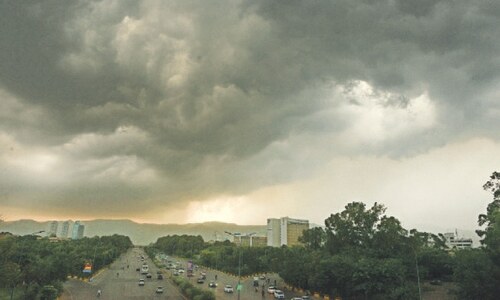THE graduation season has started. The occasions are always festive and colourful in company of students, teachers, family and friends. The twin cities of Islamabad and Rawalpindi have no less than about 30 universities and degree-awarding colleges and institutes, both in the private and public sectors. There are tens of thousands of students in these colleges and in the range of ten thousand graduating every year. The private institutions have relatively few students while the public ones are still larger and cheaper. But they are fewer in number, only about one third is government or public universities. They all compete with each other for students and teachers, and also as regards quality and relevance.
“We live in a time when the service sectors are booming,” says Professor Dr Ansari Rajput in Mohammad Ali Jinnah University (MAJU). He is a social science and management specialist who recently returned from USA.
“If graduates have taken subjects related to the service industry, they will have no problems finding work. But if they have taken traditionally prestigious fields such as engineering, they may have difficulties. But if they have combined engineering with management, they are again marketable,” Professor Rajput says.
Some days ago, Hamdard University in Islamabad had its tenth graduation ceremony. A few hundred students received their Bachelor’s and Master’s diplomas in three main fields, engineering, pharmaceutical sciences and business management. Hamdard is the oldest private university in Pakistan, with its main campus in Karachi and a relatively modest-sized Islamabad campus with about twelve hundred students.
The chancellor and vice chancellor had come up from Karachi, where Hamdard has the main campus. Sadia Rashid is the chancellor and Prof Dr Hakim Hannan is the vice chancellor. In Islamabad, Director General Professor Dr Nazeer Ahmad is in charge.
The chief guest was the Japanese Ambassador Hiroshi Oe. No sooner had he read his speech, off he was, almost in contradiction with diplomatic etiquette and Japanese friendliness, making it difficult for the hosts to show their great Pakistani hospitality. But on the Convocation Day, official guests and speeches are not the most important. It is the day for the graduating students and their parents, and also their teachers who helped them reach their goals.
Hamdard’s Islamabad campus has shifted premises a couple of times. Now, the DG informed the convocation that Hamdard Islamabad is working on plans for establishing its own, permanent campus. That will make life easier for all, with better auditoriums, classrooms, laboratories, and so on.
“But I hope the campus will be in a central location,” one of the young female students says. “When I began my studies, Hamdard was in the F-8 Sector and that was a major reason for me choosing that university. The current location for management and pharmacy students is in Blue Area and that is also convenient,” she adds.
“Our new campus will be established in Chak Shahzad on the outskirts of the city as soon as the Capital Development Authority (CDA) gives the green light. We intend to set up bus transport for students from central points in Islamabad and Rwalapindi to the new campus,” Professor Nazeer Ahmed says. “Some students will also have their own transport and others will live on or just near the campus.
“I am happy for Hamdard’s graduates in all fields,” Professor Ahmed says. “Some of them will indeed be very popular in the labour market, but some will need some time to secure a job. Some may even search for a job abroad.”
The pharmacy candidates are usually popular and they have the option of working in salaried posts or they can open their own chemistries and shops. It is also a field which many women choose.
“I hope the women find it possible in future to combine family life and a career. When they have studied for several years at university and spent a good amount of their own and the country’s money, they should make use of their qualifications,” Professor Ahmed says.
“I have no problems finding a job,” Sadia Iram says. She had a Bachelor’s degree and several years of teaching experience when she decided to go for a higher degree at Numl. She completed her Master’s degree in international relations recently, with emphasis on migration and refugee issues.
“I will continue as a secondary schoolteacher,” she says. “But part of the reason for going back to university when I was into my thirties was to get better qualifications and become more ‘saleable’. I am looking for a job in the private sector or in an NGO. I know that many teachers try the same. The main reason is the low salaries teachers earn. Yet, the work as a teacher is very rewarding,” Sadia Iram says.
After the Hamdard graduation ceremony is over, everyone flocks for chicken and rice with soft drinks.
“I am the brother of a candidate in information technology (IT),” a young man from Jhelum says. “I have been looking for a proper job for two years since I graduated,” he says. “I am now working in a telephone call centre just to earn some money. But that is not what I want to do. And I am afraid I will forget much of what I learnt if I don’t find a relevant job soon.”
The young man adds: “I am glad my younger brother has graduated with very good results in management sciences. So at least one in the family will hopefully have a good job.”
Dr B. Aysiha Mustafa, born and bread in America and married in Pakistan, says that it is very important that young graduates find work soon after graduation. “I did my advanced degree late,” she says, “studying learning psychology and teaching methods with data about the development of Allama Iqbal Open University in Islamabad, one of the world’s first distance education universities.
“It is the duty of all of us to help give courage, advice and sometimes be sponsors, so that the youth can realize their great ideas and hopes. Perhaps self - or group-employment - is one way to go but most will be employed in ordinary salaried jobs. Soon upon graduation, the youth should have an opportunity to begin applying their skills and learn from work experience,” the learning specialist says.
“The IT candidate, who said he was worried about forgetting some of what he had learned is right, should be in a hurry to find a relevant job or continue with further studies even on a part-time basis if that is more affordable for him.
“In any case, we don’t forget all what we have learned at school or university, of course, but we would like our knowledge to be up-to-date and our skills to be applied and approved. All of us would like to feel useful and contribute to the society we live in, in addition to earning a living,” says Dr Ayisha.













































Dear visitor, the comments section is undergoing an overhaul and will return soon.